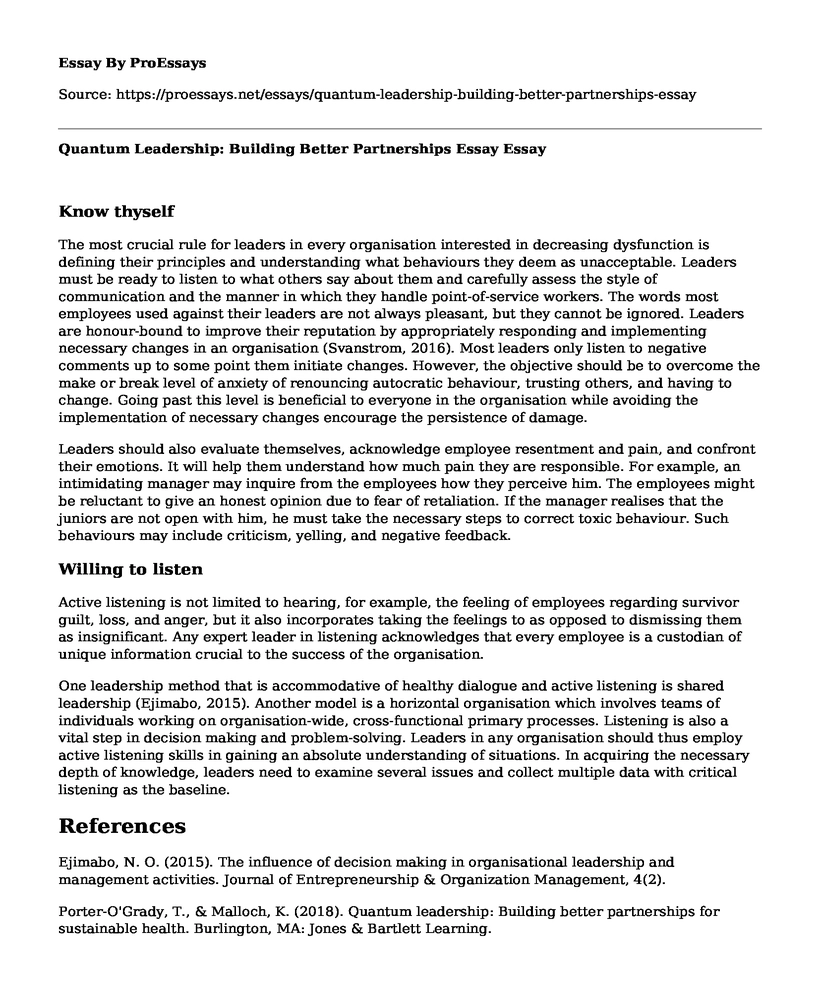Know thyself
The most crucial rule for leaders in every organisation interested in decreasing dysfunction is defining their principles and understanding what behaviours they deem as unacceptable. Leaders must be ready to listen to what others say about them and carefully assess the style of communication and the manner in which they handle point-of-service workers. The words most employees used against their leaders are not always pleasant, but they cannot be ignored. Leaders are honour-bound to improve their reputation by appropriately responding and implementing necessary changes in an organisation (Svanstrom, 2016). Most leaders only listen to negative comments up to some point them initiate changes. However, the objective should be to overcome the make or break level of anxiety of renouncing autocratic behaviour, trusting others, and having to change. Going past this level is beneficial to everyone in the organisation while avoiding the implementation of necessary changes encourage the persistence of damage.
Leaders should also evaluate themselves, acknowledge employee resentment and pain, and confront their emotions. It will help them understand how much pain they are responsible. For example, an intimidating manager may inquire from the employees how they perceive him. The employees might be reluctant to give an honest opinion due to fear of retaliation. If the manager realises that the juniors are not open with him, he must take the necessary steps to correct toxic behaviour. Such behaviours may include criticism, yelling, and negative feedback.
Willing to listen
Active listening is not limited to hearing, for example, the feeling of employees regarding survivor guilt, loss, and anger, but it also incorporates taking the feelings to as opposed to dismissing them as insignificant. Any expert leader in listening acknowledges that every employee is a custodian of unique information crucial to the success of the organisation.
One leadership method that is accommodative of healthy dialogue and active listening is shared leadership (Ejimabo, 2015). Another model is a horizontal organisation which involves teams of individuals working on organisation-wide, cross-functional primary processes. Listening is also a vital step in decision making and problem-solving. Leaders in any organisation should thus employ active listening skills in gaining an absolute understanding of situations. In acquiring the necessary depth of knowledge, leaders need to examine several issues and collect multiple data with critical listening as the baseline.
References
Ejimabo, N. O. (2015). The influence of decision making in organisational leadership and management activities. Journal of Entrepreneurship & Organization Management, 4(2).
Porter-O'Grady, T., & Malloch, K. (2018). Quantum leadership: Building better partnerships for sustainable health. Burlington, MA: Jones & Bartlett Learning.
Svanstrom, T. (2016). Time pressure, training activities and dysfunctional auditor behaviour: evidence from small audit firms. International Journal of Auditing, 20(1), 42-51.
Cite this page
Quantum Leadership: Building Better Partnerships Essay. (2022, Jun 06). Retrieved from https://proessays.net/essays/quantum-leadership-building-better-partnerships-essay
If you are the original author of this essay and no longer wish to have it published on the ProEssays website, please click below to request its removal:
- Paper Example on Leadership Preparedness among Schoolchildren in Abu Dhabi
- Operational Management at Ford Paper Example
- Why Do Some Mergers and Acquisitions Fail? - Essay Sample
- Paper Example on Strategic Control for Successful Implementation of Strategic Plan
- Essay Sample on Role of Port Facility Security Officer (FSO) in Port Security
- Essay Sample on Everest Team Decision-Making: Enhancing Project Accomplishment
- Change Management: Crafting an Organized Approach for Success - Free Essay







